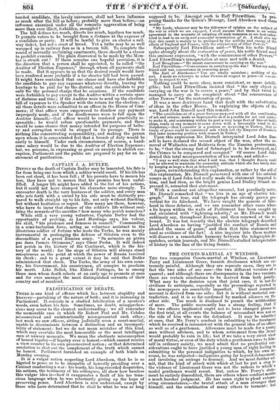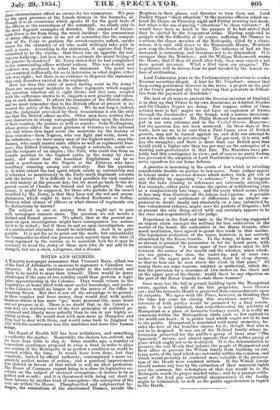'nib COURTS-MARTIAL AT WINDSOR.
THE two companion -Conrts-martial at -Windsor, on Lieutenant Perry and Lieutenant Greer, furnish disclosures which are ex- tremely painful. Although they are separate cases, they are in fact the two sides of one case—the two different versions of a quarrel ; and although there are discrepancies in the two versions, there are certain conclusions to be derived from both jointly. What may be the decision upon that joint case, it is not for civilians to anticipate, especially as the proceedings reported in the newspapers are essentially imperfect. The most connected account is derived from one side ; but it is without material con- tradiction, and it is so far confirmed by marked silences on the other side. Too much is disclosed to permit the withholding of more. The public necessarily has a strong feeling, that if the two officers implicated ought not to have changed places in the first trial, at all events the balance of misconduct was not on the side of him who was the defendant. It may be admitted at once, that Mr. Perry's conduct in submitting to the treatment which he received is inconsistent with the general idea of an officer as well as of a gentleman. Allowance must be made for a young man without advisers, and to whom retirement from the Army would probably be ruin in life; but if we take a very strict view of moral virtue, or even of the duty which a gentleman owes to him- self in ordinary society, we must admit that no prudential con- siderations ought to have justified a young man of right feeling in submitting to the personal indignities to which, by his own ac- count, he was subjected—indignities going far beyond debasement, and involving an outrage to decency. And we must further ad- mit, that the kind of attack with which at last he put a stop to the violence of Lieutenant Greer was not the redress to which a model gentleman world resort. But, unless Mr. Perry's state- ment be entirely discredited, there are others whose conduct merits a much harsher judgment. He has some right to plead extenu- ating circumstances,—the brutal attack of a man stronger than himself, and the combination of many others to torment: but
these circumstances afford no excuse for his tormentors. We pass by the open presence of the female witness in the barracks, al- though it is an occurrence which speaks ill for the good taste of the officers or the correctness of the command; we allude only to the most flagrant examples of disorder. The conduct of Lieute- nant Greer is far from being the worst incident: the concurrence of many officers to share in an act of cowardice like the compul- sion of Mr. Perry to perform the sword-exercise naked, speaks worse for the character of all who could willingly take part in such a scene. According to the statement, it appears that Perry submitted to be the victim ; that Greer has an appetite for out- rageous bullying ; but how are we to estimate the moral feeling of the passive bystanders? Mr. Perry stated that be had complained to his commanding-officer without redress. This was denied, and evidence was produced to rebut the statement. The point was not examined sufficiently for us to determine in what degree either side was right ; but there is no evidence to disprove the statement that such disorders existed in the regiment.
How far does this state of moral feeling. exist in the Army ? There are occasional incidents in other regiments which suggest the question whether all is sight there; and this case, coupled with the sufferance shown to it, imparts a new gravity and exten- sion to such doubts. It affects the character of the British officer, and we must remember that to the British officer at present is in- trusted the safety of the British Army. We do not forget, indeed, that the judgment provoked by these transactions is not the only one that the British officer merits. Other men have written their own characters in strong autographic inscription upon the history of their country, the juniors as well as seniors : from Wellingtons, whose genius added the most glorious of victories to the national list, and whose firm hand wrote the materials for the history of those victories—from Napiers, who can fight and write, down to the subalterns,—we have many men of the highest mark ; men like Burnes, who could master state affairs as well as regimental busi- ness; like Eldred Pottinger, who, though a subaltern, could sus-
tain the outposts of an empire ; Nott, who could rise from an humble position to the highest ranks in the Army by sheer merit, and show that the humblest Englishman can be as much a gentleman as the Pagets or the Fitzroys who have hereditary standing among our chivalry. But the question is, to what extent the bad spirit which' exists so extensively and is tolerated so monstrously in the Forty-sixth Regiment coexists with the better? It is difficult to find parallels for such conduct in civil society at the present day, but we must go back to the de- praved court of Charles the Second and its gallants. The only excuse it might be supposed, for those who partake in the scenes described by Mr. Perry, is that they have not the wit and accom- plishments which ought to have checked Rochester or Sedley. Between what classes of officers or what classes of regiments can the distinctions be drawn ?
The subject is one so serious that it ought not to pass with newspaper censure alone. The question we ask merits a distinct and formal answer. We admit, that at the present mo- ment an open investigation might have consequences too serious for it to be risked ; but if there be not an open investigation, one of a confidential character should be instituted. And it is quite possible. It is not for us to point out the mode, but undoubtedly the Commander-in-chief can procure such reports upon the state of every regiment in the service as to ascertain how far it may be necessary to weed the Army of those men who do not add to its strength, but are a stain, a disgrace, and a disease.



































 Previous page
Previous page